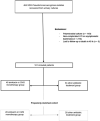Aminoglycoside or Polymyxin Monotherapy for Treating Complicated Urinary Tract Infections Caused by Extensively Drug-Resistant Pseudomonas aeruginosa: A Propensity Score-Adjusted and Matched Cohort Study
- PMID: 34860333
- PMCID: PMC8847631
- DOI: 10.1007/s40121-021-00570-z
Aminoglycoside or Polymyxin Monotherapy for Treating Complicated Urinary Tract Infections Caused by Extensively Drug-Resistant Pseudomonas aeruginosa: A Propensity Score-Adjusted and Matched Cohort Study
Abstract
Introduction: Extensively drug-resistant (XDR) Pseudomonas aeruginosa (PA) infections are difficult to treat. We aimed to compare aminoglycosides or polymyxin monotherapy versus other antibiotic regimens (carbapenems, aztreonam, ceftazidime, cefepime, ceftolozane-tazobactam, or ceftazidime-avibactam) in complicated urinary tract infections (cUTI) caused by XDR-PA.
Methods: Study performed at a tertiary-care hospital from 2010 to 2019. All consecutive adult patients with XDR-PA urine cultures and diagnosed with cUTI were retrospectively reviewed. XDR phenotype was defined according to Magiorakos et al. A propensity score was used as a covariate in multivariate analyses and for matching. Primary outcome was early clinical failure and at end of treatment (EOT). Main secondary outcomes were 30- and 90-day mortality, microbiological clearance, and antibiotic-related side effects.
Results: Of the 465 episodes screened, 101 were included, 48% were treated with aminoglycoside or colistin monotherapy. Most XDR-PA were susceptible to colistin (100%) and amikacin (43%). Patients treated with antibiotic regimens other than aminoglycosides or polymyxin monotherapy were more likely to have hematologic malignancy (p < 0.001), higher SOFA score (p = 0.048), and bacteremia (p = 0.003). In multivariate models adjusted by propensity score, aminoglycoside or colistin monotherapy was not associated with worse outcomes. After propensity score matching, 28 episodes in each treatment group were matched. Adjusted ORs (95% CI) for early clinical failure and at EOT with aminoglycosides or polymyxin monotherapy were 0.53 (0.18-1.58) and 1.29 (0.34-4.83), respectively. Aminoglycoside or colistin monotherapy was not associated with higher 30-day (HR 0.93, 95% CI 0.17-5.08) or 90-day mortality (HR 0.68, 95% CI 0.20-2.31), nor with absence of microbiological clearance (OR 0.72, 95% CI 0.33-1.58). No statistically significant differences were found in terms of nephrotoxicity. Clostridioides difficile infection was observed only in the "other antibiotic regimens" group (n = 6, 11.3%).
Conclusions: Aminoglycosides or polymyxin monotherapy showed good efficacy and safety profile in treating cUTI caused by XDR-PA. These results may be useful for antibiotic stewardship activities.
Keywords: Amikacin; Antimicrobial stewardship; Colistin; Extensively drug-resistant Pseudomonas aeruginosa; Urinary tract infections.
© 2021. The Author(s).
Figures
Similar articles
-
Extensively drug-resistant Pseudomonas aeruginosa: clinical features and treatment with ceftazidime/avibactam and ceftolozane/tazobactam in a tertiary care university hospital center in Portugal - A cross-sectional and retrospective observational study.Front Microbiol. 2024 Feb 13;15:1347521. doi: 10.3389/fmicb.2024.1347521. eCollection 2024. Front Microbiol. 2024. PMID: 38414772 Free PMC article.
-
Time-Kill Evaluation of Antibiotic Combinations Containing Ceftazidime-Avibactam against Extensively Drug-Resistant Pseudomonas aeruginosa and Their Potential Role against Ceftazidime-Avibactam-Resistant Isolates.Microbiol Spectr. 2021 Sep 3;9(1):e0058521. doi: 10.1128/Spectrum.00585-21. Epub 2021 Jul 28. Microbiol Spectr. 2021. PMID: 34319141 Free PMC article.
-
Comparative Analysis of Complicated Urinary Tract Infections Caused by Extensively Drug-Resistant Pseudomonas aeruginosa and Extended-Spectrum β-Lactamase-Producing Klebsiella pneumoniae.Antibiotics (Basel). 2022 Oct 29;11(11):1511. doi: 10.3390/antibiotics11111511. Antibiotics (Basel). 2022. PMID: 36358167 Free PMC article.
-
Ceftazidime/avibactam and ceftolozane/tazobactam for the treatment of extensively drug-resistant Pseudomonas aeruginosa post-neurosurgical infections: three cases and a review of the literature.Infection. 2021 Jun;49(3):549-553. doi: 10.1007/s15010-020-01539-9. Epub 2020 Oct 19. Infection. 2021. PMID: 33074365 Free PMC article. Review.
-
An update on the management of urinary tract infections in the era of antimicrobial resistance.Postgrad Med. 2017 Mar;129(2):242-258. doi: 10.1080/00325481.2017.1246055. Epub 2016 Oct 21. Postgrad Med. 2017. PMID: 27712137 Review.
Cited by
-
Extensively drug-resistant Pseudomonas aeruginosa: clinical features and treatment with ceftazidime/avibactam and ceftolozane/tazobactam in a tertiary care university hospital center in Portugal - A cross-sectional and retrospective observational study.Front Microbiol. 2024 Feb 13;15:1347521. doi: 10.3389/fmicb.2024.1347521. eCollection 2024. Front Microbiol. 2024. PMID: 38414772 Free PMC article.
-
Rapid Reversal of Carbapenemase-Producing Pseudomonas aeruginosa Epidemiology from blaVIM- to blaNDM-harbouring Isolates in a Greek Tertiary Care Hospital.Antibiotics (Basel). 2024 Aug 12;13(8):762. doi: 10.3390/antibiotics13080762. Antibiotics (Basel). 2024. PMID: 39200062 Free PMC article.
-
A Systematic Literature Review of the Epidemiology of Complicated Urinary Tract Infection.Infect Dis Ther. 2025 Jun;14(6):1157-1181. doi: 10.1007/s40121-025-01149-8. Epub 2025 Apr 24. Infect Dis Ther. 2025. PMID: 40268815 Free PMC article. Review.
-
Efficacy and safety of piperacillin-tazobactam compared with meropenem in treating complicated urinary tract infections including acute pyelonephritis due to extended-spectrum β-lactamase-producing Enterobacteriaceae.Front Cell Infect Microbiol. 2023 May 3;13:1093842. doi: 10.3389/fcimb.2023.1093842. eCollection 2023. Front Cell Infect Microbiol. 2023. PMID: 37207190 Free PMC article.
-
Assessment of mortality-related risk factors and effective antimicrobial regimens for treatment of bloodstream infections caused by carbapenem-resistant Pseudomonas aeruginosa in patients with hematological diseases.Front Cell Infect Microbiol. 2023 Jun 21;13:1156651. doi: 10.3389/fcimb.2023.1156651. eCollection 2023. Front Cell Infect Microbiol. 2023. PMID: 37415825 Free PMC article.
References
-
- Horcajada JP, Montero M, Oliver A, et al. Epidemiology and treatment of multidrug-resistant and extensively drug-resistant Pseudomonas aeruginosa infections. Clin Microbiol Rev. 2019;32:e00031–19. http://cmr.asm.org/content/32/4/e00031-19.abstract. - PMC - PubMed
-
- Goodlet KJ, Benhalima FZ, Nailor MD. A systematic review of single-dose aminoglycoside therapy for urinary tract infection: is it time to resurrect an old strategy? Antimicrob Agents Chemother. 2018;63. https://aac.asm.org/content/63/1/e02165-18. - PMC - PubMed
Grants and funding
LinkOut - more resources
Full Text Sources


